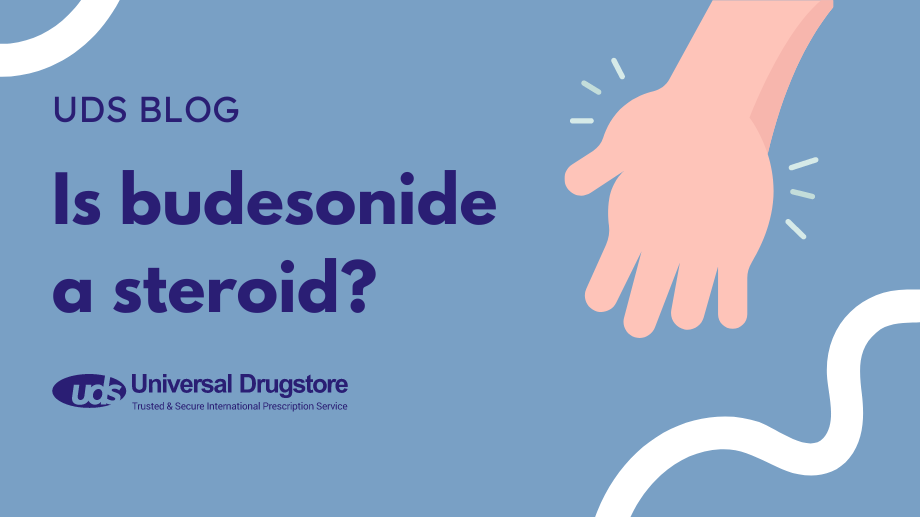Is Budesonide a steroid?

Yes, budesonide is considered a corticosteroid. Corticosteroids are synthetic drugs that resemble cortisol, a hormone released by the adrenal gland. This class includes glucocorticoids and mineralocorticoids, though “corticosteroids” generally refers to glucocorticoids. Other examples include prednisone, prednisolone, and methylprednisolone. These medications reduce inflammation by decreasing production of certain chemicals, and at higher doses they also suppress immune system activity. They are used for a wide range of conditions.
What does budesonide treat?
Asthma and chronic obstructive pulmonary disease (COPD)
Budesonide inhalation solution and inhalers prevent breathing difficulties, wheezing, cough, and chest tightness due to asthma and COPD by reducing airway swelling and irritation.
Inflammatory bowel diseases (IBDs)
Budesonide capsules and tablets treat GI tract, colon, and rectal disorders such as Crohn’s disease, ulcerative colitis, and microscopic colitis. Available in delayed‑release and extended‑release formulations.
Primary immunoglobulin A nephropathy
Tarpeyo delayed‑release capsules are approved for this kidney disease, where excess immunoglobulin A causes inflammation. Budesonide reduces inflammation and decreases immunoglobulin A production.
Nasal polyps
Budesonide nasal spray can shrink painless, soft nasal growths that block airflow.
Hay fever and allergies
Budesonide nasal spray treats itchy or runny nose, sneezing, and other allergy symptoms by preventing inflammation associated with allergic reactions.
What are the side effects of budesonide?
Common side effects (clinical trials vs. placebo)
- Inhalers/nebulizer solution: Cold symptoms (stuffy/runny nose, sore throat, cough), viral upper respiratory infection, nausea, stomach virus
- Nasal spray: Nosebleeds, sore throat
- Oral tablets and capsules: Headache, respiratory infection, nausea, back pain, joint pain, dizziness, indigestion, gas, stomach pain, vomiting, tiredness, pain
Other less serious side effects
- Inhalers/nebulizer solution: Middle ear infection, oral thrush
- Nasal spray: Cough, nasal irritation
- Oral tablets and capsules: Acne, easy bruising, facial/leg swelling, abnormal hair growth, stretch marks, fast heartbeat, increased appetite, weight gain, nervousness, trouble sleeping
Rare but serious side effects
- Severe allergic reaction: hives, face/tongue/throat swelling, shortness of breath — seek emergency care immediately.
- Hormone changes: high-dose or long-term use mimics excess cortisol (weight gain, facial/back swelling, limb fat loss); abrupt stop may cause low-cortisol symptoms (nausea, appetite loss, weakness, diarrhea).
- Vision changes: long-term use can increase eye pressure, worsen glaucoma, and cause cataracts; report blurry vision or eye discomfort immediately.
- Increased infection risk: weakened immunity may raise fungal, bacterial, or viral infection risk; avoid sick contacts and seek care if fever, chills, cough, or breathing trouble develop.
- Worsening other conditions: may exacerbate diabetes, high blood pressure, osteoporosis, glaucoma, and stomach ulcers; close monitoring may be needed.
- Delayed growth in children: use lowest effective dose for shortest duration; discuss growth concerns with a healthcare provider.
Are there any drug interactions with budesonide?
Using budesonide with other prescription drugs, over‑the‑counter medications, vitamins, or supplements may alter their effects or increase side effects. Inform your healthcare provider about all you take, including:
- Antacids
- HIV/hepatitis protease inhibitors
- Erythromycin, clarithromycin
- Ketoconazole, itraconazole
- Cyclosporine
- Cimetidine
- Grapefruit juice
This list may not include all possible interactions.
What warnings and precautions are there with budesonide?
Do not take budesonide if allergic to it or any inactive ingredients. Inhalation powder contains milk proteins—avoid if allergic. Inhalers should not be used during an asthma attack; keep a short‑acting inhaler available.
Tell your healthcare provider if you have:
- Diabetes
- Active infection or tuberculosis exposure
- History of chicken pox or measles exposure
- Stomach ulcers
- Liver disease
- Glaucoma or cataracts
- Osteoporosis
- High blood pressure
- Adrenal insufficiency
- Planned surgery
- Pregnancy or planning pregnancy
- Breastfeeding or planning to breastfeed
What dosage forms of budesonide are available?
Budesonide is available as tablets, capsules, granules, and dissolvable tablets for GI tract and other inflammatory diseases. It is also available as:
- An inhaler for asthma and COPD
- A nasal spray for allergic rhinitis, hay fever, and nasal polyps
- A rectal foam and enema for ulcerative colitis
Does budesonide affect the immune system?
Budesonide may suppress immune function, increasing susceptibility to infections such as common cold, flu, and respiratory infections. Avoid contact with sick individuals, especially those with shingles, chickenpox, or measles.
Related Medications
- Entocort EC (budesonide)
- Entocort Enema (budesonide)
- Pulmicort Flexhaler (budesonide)
- Rhinocort AQ Nasal Spray (budesonide)
- Pulmicort Respules (budesonide)
- Uceris (budesonide)
- Tarpeyo (budesonide)
Sources
- Budesonide inhaled (Rx). Medscape. Accessed Aug. 7, 2024.
- Budesonide rectal (Rx). Medscape. Accessed Aug. 7, 2024.
- Budesonide intranasal (Rx, OTC). Medscape. Accessed Aug. 7, 2024.
- Budesonide (Rx). Medscape. Accessed Aug. 7, 2024.
- Rubin D., et al. The American College of Gastroenterology clinical guideline: Ulcerative colitis in adults. Accessed Aug. 7, 2024.





